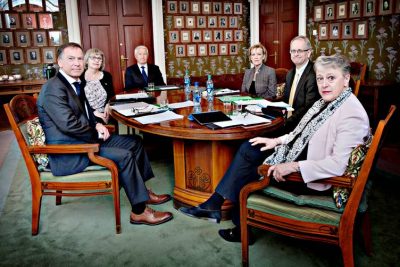A power shift has quietly occurred on the Norwegian Nobel Committee, which will announce the winner of the next Nobel Peace Prize winner in October. The death last winter of the committee’s leader, Kaci Kullmann Five of the Conservative Party, led to members appointed by the Labour Party gaining majority control, at least until the next parliamentary election this fall.

Under the terms of Peace Prize benefactor Alfred Nobel’s will, the committee awarding the Nobel Peace Prize is to be appointed by the Norwegian Parliament. It’s thus supposed to reflect the make-up of Parliament after every election. When the Conservatives won government power away from Labour in 2013, they could also appoint another member of their choice, Henrik Syse. The conservative Progress Party, which also did well in the election, re-appointed its choice of member, Inger-Marie Ytterhorn.
Along with Five, representatives of Norway’s conservative parties in Parliament thus held the majority on the five-member committee to which they were entitled. They used it to also ultimately unseat committee member Thorbjørn Jagland, a former Norwegian prime minister from the Labour Party, as committee leader (chair) and Five took control. The committee members voted for Reiss-Andersen as the committee’s deputy leader.
When Five became too ill with cancer to host the annual Nobel Peace Prize ceremony in December, however, Reiss-Andersen took over as Five’s deputy and also held the annual opening address. Five died in February, and Reiss-Andersen, a lawyer appointed to the committee by the Labour Party in 2012, was formally elected as committee leader at a meeting on May 2.
In a one-paragraph announcement of that, the committee also reported that they had simply decided themselves to also elevate a reserve member of the committe who also had been selected by Labour, Tone Jørstad, to fill the void then left by Reiss-Andersen’s elevation to committee leader. That left Labour with three seats on the committee (Reiss-Andersen, Jagland and Jørstad) compared to two for the conservatives, even though the conservatives still hold a majority in Parliament.
No firm rules
Olav Njølstad, who was selected by the former committee to be its secretary and director of the Norwegian Nobel Institute, cited historic precedent. “There was nothing in the statutes about how a member should be replaced if the member dies,” Njølstad told newspaper Dagens Næringsliv (DN) on Wednesday. “We found out that earlier practice was very clear: If a member dies, he or she is replaced by the vara (reserve) member standing by. As far as we can see there are no examples of the Parliament appointing a new member to replace a member who has died.”
In the cases of resignations, such as those that came in 1973 and 1994 in objection to controversial winners Henry Kissinger and Yasir Arafat, the Parliament did step and name replacements. Njølstad told DN he saw “no need” to consult the Parliament after Five’s death.
That means the next Nobel Peace Prize will be chosen by a Labour-dominated committee that’s led by a Labour appointee. The committee, in its brief announcement last month, noted that “The Norwegian Parliament (Stortinget) will later decide the composition of the Committee for the period 2018-2020.” That will take place after this fall’s parliamentary election.
Conservatives raising questions
Trond Helleland, leader of the Conservatives delegation in Parliament, was surprised by the committee’s actions and raised questions on Wednesday over whether the rules regarding appointments should be changed. “There could be clearer guidelines,” he told DN, regarding which situations should prompt a new parliamentary appointment and when a reserve member should take over.
Both Helleland and the president of the Parliament, Olemic Thommessen, had been waiting for the Norwegian Nobel Committee to contact and consult them after Five died. Helleland told DN he didn’t think it was appropriate for him to contact the committee, since it’s ultimately independent of the government and any Parliamentary control.
“We thought it would be natural for the Nobel Committee to approach the Parliament and ask if a new member was desired,” Helleland told DN. “It’s not natural for the Parliament to approach the committe and ask for a new member.”
Helleland said he doesn’t think the committee acted, though, in a way aimed at gaining power for the Labour Party. “I think they have personal integrity and make their own independent evaluations,” Helleland told DN. The next Peace Prize will, as always, be formally awarded on December 10, the anniversary of Alfred Nobel’s death.
newsinenglish.no/Nina Berglund

